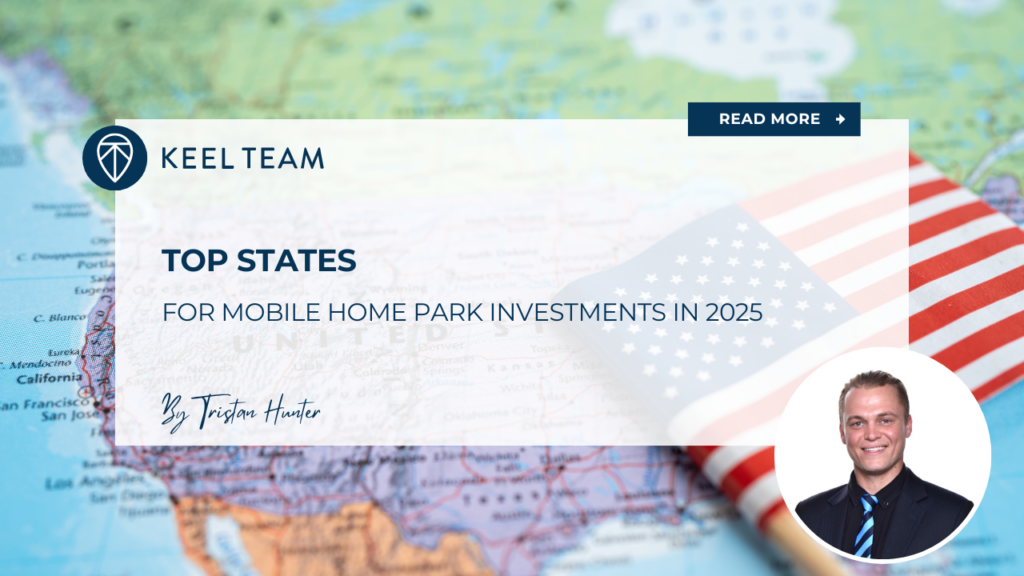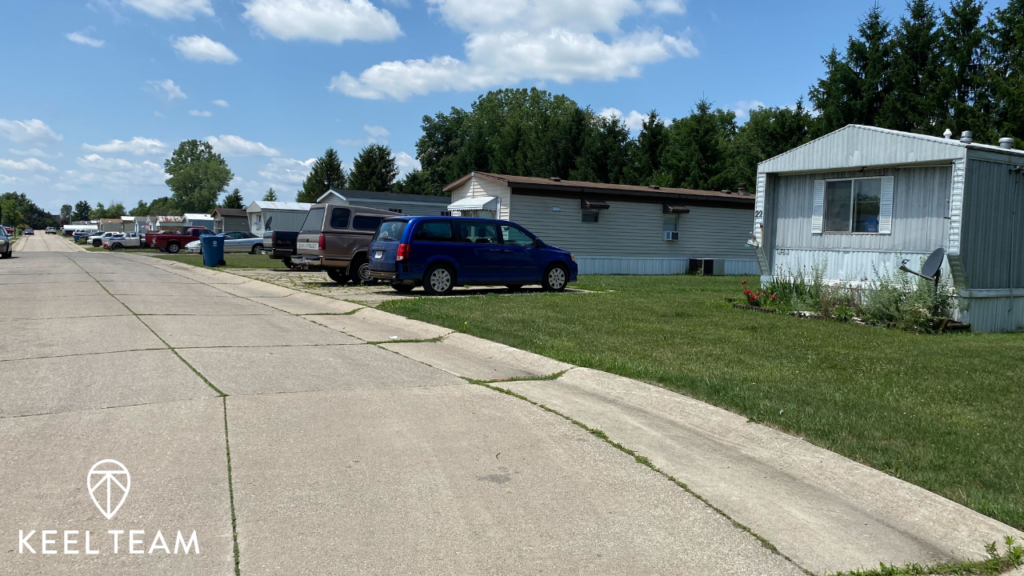Top States for Mobile Home Park Investments in 2025
-
 Tristan Hunter - Investor Relations
Tristan Hunter - Investor Relations

Mobile home parks continue to attract investors seeking stable returns in an evolving real estate market. In 2025, several states are expected to be hotspots for mobile home park investments, driven by population growth, favorable regulations, and rising demand for affordable housing. This analysis explores the top states to consider and the data behind these trends.
1. Texas: Economic Expansion and Diverse Population Base
Texas has long been a favorite for real estate investors, and mobile home parks are no exception. The state’s economic expansion, backed by the technology, healthcare, and energy sectors, has led to a population increase of 1.6% annually, as per U.S. Census Bureau data. Cities like Austin, Dallas, and Houston typically attract a diverse group of residents, many of whom prefer cost-effective living arrangements.
Texas’s regulatory framework generally allows mobile home parks to operate efficiently. Zoning regulations often permit the development of these trailer parks on the outskirts of urban areas, meeting the demand for suburban and rural housing. Moreover, Texas has no state income tax, which can potentially make mobile home park operations more profitable.
2. Arizona: Growing Retiree Population and Affordable Land
Arizona’s retiree population has been expanding, and this trend shows no sign of slowing down in 2025. The Arizona Office of Economic Opportunity reports that retirees are drawn to the state’s warm climate and lower cost of living. Mobile home parks provide an attractive option for this demographic, contributing to historically high occupancy rates and consistent demand.
Another common advantage Arizona offers investors is the availability of affordable land. Suburban and rural areas around Phoenix and Tucson remain cost-effective for mobile home park development, typically allowing investors to acquire large plots without excessive costs. Zoning laws also support these developments, creating a favorable environment for investors looking to enter the development market.
Download our FREE eBook on the Top 20 things to know BEFORE investing in mobile home parks!
3. North Carolina: Rapid Urban Growth and Infrastructure Development
North Carolina has emerged as an attractive state for mobile home park investments due to its rapidly growing urban areas and ongoing infrastructure projects. The North Carolina Department of Commerce highlights that cities like Raleigh, Charlotte, and Durham have seen significant population growth over the last decade. With this urban expansion comes a need for affordable housing options, such as mobile home parks.
Additionally, North Carolina’s pro-business policies and tax incentives can create a friendly environment for real estate investors. Zoning laws in suburban areas often favor Mobile Home Park developments, aiming to ensure that investors can tap into growing markets without extensive regulatory hurdles.
4. Georgia: Affordable Land and Growing Workforce Population
Georgia continues to gain traction as a hotspot for mobile home park investments, especially around Atlanta and Savannah. The Georgia Department of Economic Development reports that these cities have seen a steady influx of workers in logistics, manufacturing, and technology. This growing workforce population generally drives demand for affordable housing, making mobile home parks an appealing option.
Georgia offers relatively affordable land prices in suburban and rural areas. The state’s zoning regulations often support mobile home park developments, making it easier for investors to obtain permits and approvals. With an expanding job market and population growth expected to continue, Georgia presents opportunities for investors seeking long-term return potential.

5. Tennessee: Booming Tourism and Population Growth
Tennessee’s economy benefits from a booming tourism sector and an influx of residents from neighboring states. The Tennessee Department of Economic and Community Development highlights that cities like Nashville and Chattanooga attract new residents due to their affordable cost of living and job opportunities. This population growth may lead to an increased demand for mobile home parks, especially in suburban and rural areas.
Tennessee’s relatively low property taxes and supportive zoning laws also make it a favorable location for mobile home park investments. Many counties have streamlined processes for developers, allowing investors to manage operations with less regulatory interference. As the state continues to attract new residents, occupancy rates in mobile home parks are expected to remain high.
6. Alabama: Strategic Location and Growing Manufacturing Sector
Alabama offers a strategic location for mobile home park investors, particularly in the Birmingham and Huntsville areas. The state’s growing manufacturing sector attracts workers who often seek affordable housing options. According to the Alabama Department of Labor, the state’s job growth in this sector is expected to continue, which can support demand for mobile home parks.
Alabama’s zoning regulations are generally investor-friendly, especially in suburban and rural areas. The state also has one of the lower property tax rates in the U.S., which can reduce operating costs and potentially boost profit margins for mobile home park owners.
7. Indiana: High Demand for Affordable Housing and Economic Stability
Indiana remains a solid choice for investors looking at mobile home parks due to its historically stable economy and demand for affordable housing. The Indiana Economic Development Corporation emphasizes that the state’s economy is diversified, with a mix of manufacturing, healthcare, and education sectors. This stability typically attracts workers and families seeking budget-friendly living solutions.
Land prices in Indiana, particularly in the suburbs of Indianapolis, Fort Wayne, and South Bend, remain relatively low compared to other regions. The zoning environment is generally supportive, typically allowing investors to develop or expand mobile home parks without facing substantial barriers.

8. South Carolina: Economic Growth and Expanding Urban Areas
South Carolina’s economy continues to grow, attracting new residents, particularly around cities like Charleston and Greenville. The South Carolina Department of Commerce points out that these areas have seen notable job growth in industries like technology and healthcare. As more people move to these urban centers, the demand for affordable housing, including mobile home parks, generally increases.
Land acquisition costs in South Carolina’s suburban areas remain competitive, and the zoning regulations are often favorable for mobile home park developments. Investors might find the state’s relatively low property taxes appealing, as these can likely reduce overall expenses and boost profitability potential.
9. Florida: Population Growth and Favorable Regulations
Florida stands out as a prime location for mobile home park investments in 2025. With a steady influx of retirees and families seeking affordable living, the state’s population has been growing consistently. The Florida Department of Economic Opportunity forecasts a population increase of over 300,000 people annually for the next decade. This growth typically boosts demand for affordable housing options, making mobile home parks a viable solution.
The regulatory environment in Florida also supports mobile home park operations. Zoning laws tend to favor these developments, and there are incentives for providing affordable housing units. Investors often find that acquiring and managing mobile home parks in Florida requires less red tape, which may reduce operating costs and expedite project timelines. Florida’s mobile home park market is largely saturated and expensive, with limited opportunities remaining for value-add mobile home park investing.
Conclusion
Some of the best states for mobile home park investments in 2025 likely include Florida, Texas, Arizona, North Carolina, Georgia, Tennessee, Alabama, Indiana, and South Carolina. Each state offers unique potential advantages, from population growth and favorable regulations to affordable land and economic stability. Investors could explore these hotspots to potentially maximize returns while tapping into the growing demand for affordable housing options.
Book a 1-on-1 consultation with Andrew Keel to discuss:
- A mobile home park deal review
- Due diligence questions
- How to raise capital from investors
- Mistakes to avoid, and more!
Disclaimer:
The information provided is for informational purposes only and is not investment advice or a guarantee of any kind. We do not guarantee profitability. Make investment decisions based on your own research and consult registered financial and legal professionals. We are not registered financial or legal professionals and do not provide personalized investment recommendations.

Tristan Hunter - Investor Relations
View The Previous or Next Post
Subscribe Below 👇





